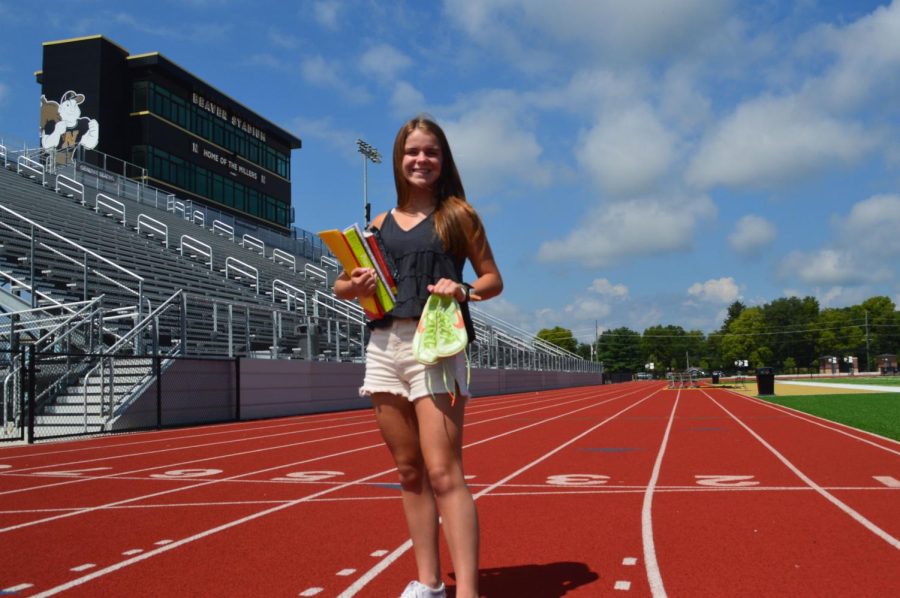Student-athlete stability: How and why student-athletes balance academics and athletics
September 16, 2022
Kennedy Applegate is tired. She’s already completed a full day of school, studying, and practice. To calm down, she relaxes in the shower with the invigorating coolness of water rushing across her skin, washing away all of the sweat and exhaustion, refreshing her mind. The stress of the day disappears with the foam and the bubbles, and her tension rinses away, bringing a renewed focus and energy. She is savoring these relaxing moments, a break between shampoo and conditioner, between sports and studying.
Kennedy Applegate, a junior at Noblesville High School, exceeds the expectations of the stereotypical student athlete reputation: the day to day repetitive routine of attending practice and completing homework. Applegate’s complex schedule of participating in a multitude of honors and advanced placement courses is intertwined with the cross country and track training throughout the school year. Her packed schedule requires dedication and severe time management.
“I am a planner,” Applegate said. “It helps me stay focused and organized.”
Even if it means staying up later and losing sleep, after a long practice or meet, Applegate goes about her steadfast routine of eating and showering, and then she starts assignments.
“I don’t procrastinate. I get home from practice and then complete any homework for that day,” Applegate said.
Applegate’s efficient agenda allows her to balance the aspects of academics and athletics. Apart from the physical elements of sports and school, such as practice and homework, she also balances the mental and social relationships. Applegate has benefited socially by having the majority of her friends on the cross country and track team. However, her social perk is occasionally contrasted by the difficulties and disadvantages of mentality.
“The mentality of being a student athlete is definitely the most difficult part,” Applegate said.
Applegate uses her motivation to combat the difficulties of the student athlete mindset.
“My motivation for sports is my team, and the feeling of working hard and achieving something is so great,” Applegate said.
During the stress and overwhelming to-do-lists that the student athlete lifestyle invites, Applegate not only depends on her productive routine, but also her faith.
“I’m a Christian, so I rely on my faith to avoid being overstressed,” Applegate said.
A fellow cross country and track teammate of Applegate, Ella Wirkner, a sophomore at, follows a shockingly similar student athlete timetable. Wirkner’s sports schedule is accompanied by the assignments of honors and extracurricular classes, creating a busy daily routine to manage. Returning home after school and practice, Wirkner immediately prioritizes her school work.
“I put my phone away and I won’t watch any television,” Wirkner said, “so I can always make sure I have time for my homework.”
Time seems to be a common factor within the success of student athletes. Yet it can also be their downfall. Wirkner enhances this theory.
“It can be super stressful when I have a lot to do, but not much time,” Wirkner said.
Instead of allowing the lack of time to prevail, student athletes attempt to make school and sports work hand in hand. This strategy not only relieves stress, it also invites joy.
“Running makes me happy,” Wirkner said, “the cross country and track team is my happy place.”
A sophomore lacrosse player, Molly Adams echoed Wirkner’s point of finding happiness in sports.
“Lacrosse takes away the stress and takes my mind off of everything that happened throughout that day,” Adams said.
Adams is another student who excels in academics through honors and advanced placement classes. The difficulty that comes with being a student can already be overwhelming enough, especially with sports added to the equation. One of the difficulties is self-criticism.
“I think there are a lot of expectations around student athletes,” Adams said, “you have to be perfect, you have to be the best.”
Adams also admitted that her own standards for herself contribute to the student athlete stereotype of perfection.
“I always think to myself, ‘just do it better next time, just study harder next time, just listen better next time, just do the play right next time, just do better next time.’” This is a repetitive monologue within Adams’ mind, as well as the minds of many other student athletes.
In order to combat the trials and tribulations of balancing academics and athletics, student athletes have to develop specific skills and tricks to improve their triumphs. Advice is often offered, whether it’s through self-learned abilities from experience or healthy habits that are advised to them in study sessions and pre-game-pep-talks. Adams advises fellow student athletes to use the challenges of school and sports to their advantage.
“One mistake might make it seem like everything is going to go downhill from there,” Adams said, “but that mistake might actually help you improve.”
Despite helpful time management techniques, Wirkner believes that the student-athlete lifestyle can be demanding.
“Balancing your homework and sport can be stressful. Just make sure you don’t get too overwhelmed by your sport and get caught up in it and vice versa,” Wirkner said.
Student-athletes face these obstacles that appear within the tricky maze of school and sports; time management, physical and mental strain, and even social relationships being at risk. So the essential question remains: How do student athletes remain successful within academics and athletics despite the stress? The answer lies in the life-lessons they learn and acknowledging that it is a balance; they could fail, they could succeed, but in the end the result does not define their life or identity. Student athletes continue to display impressive grades and athletic abilities by utilizing the life-lesson to appreciate the process without overthinking the inevitable outcome.
Additionally to Adams and Wirkner’s suggestions, Applegate advised to take a look at the big picture.
“Don’t let school and sports control your life,” Applegate said, “in the grand scheme of things, it does not matter.”





